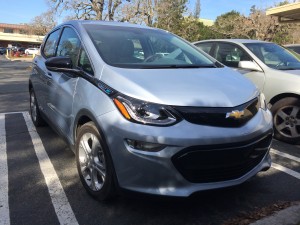Sure, electric vehicles are fun to drive, reduce local air pollution and greenhouse gas emissions, and can save you a lot of money on fuel at the same time. But are they safe?
 We know the Tesla Model S achieved the highest safety rating ever recorded by the federal government, mostly because of the lack of front engine block. As a result, the car has a huge crumple zone for cushion in the result of a front-end impact.
We know the Tesla Model S achieved the highest safety rating ever recorded by the federal government, mostly because of the lack of front engine block. As a result, the car has a huge crumple zone for cushion in the result of a front-end impact.
But what about the non-premium electric vehicles, particularly the new long-range, mass-market Chevy Bolt EV? The federal government has not released crash test information yet on this car, but a new safety test looks very promising, per cars.com:
Chevrolet’s all-electric car is the first of its kind to earn high safety scores from the Insurance Institute for Highway Safety. The safety group gave the 2017 Chevrolet Bolt EV the Top Safety Pick nod, one test short of its highest rating.
The electric hatchback earned good ratings in all five crash tests, including small overlap front, moderate overlap front, side, roof strength and head restraint evaluations; the Bolt’s optional front crash prevention system earned a superior rating. According to IIHS, the Bolt automatically avoided a crash in tests at both 12 and 25 mph.
Evidently the only knock on the car is the glare from its headlights. Meanwhile, the Nissan LEAF did not fare as well.
Like any car, design is important for safety. But the fact that EVs don’t have big engine blocks in front clearly gives them a strong advantage in this respect. It’s yet one more reason for consumers to consider making the switch from gas to electricity to power their vehicles.


